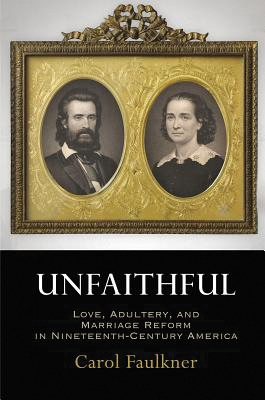Unfaithful
Love, Adultery, and Marriage Reform in Nineteenth-Century America
Defining marriage and adultery is tricky, and it was even trickier in the 1800s. In the heady but colorful Unfaithful, Carol Faulkner gives the history of American marriage reformers. These rebels and thinkers, along with some straight-up abusers and oddballs, challenged marital standards. This history shows that their own experimental relationships were often less idyllic than their philosophies.
Reformers said marriage should be based on love, desired by both parties, and that women should be equal and willing partners in physical relationships. It was a hot topic at the same time as feminism and the abolition movement, and Faulkner discusses fascinating intersections between marriage reform, women’s rights, and the push to end slavery. A nineteenth-century trend of comparing wifehood to slavery runs throughout the book, highlighting how women’s roles in unequal, unloving marriages were seen as a form of servitude, both during and after times of actual slavery in the US.
The book also reveals that marriage reformers were mostly heterosexual and white, but Faulkner takes care to introduce historical figures who broke that mold. Paschal Beverly Randolph, a spiritualist of mixed race, is a dynamic personality who cowrote the 1860 book Human Love, but then came to an about-face in his thinking. Mary Louise Booth is another fascinating figure; she escaped her marriage to a cheating husband to begin a new life with feminist Mathilde Anneke in Switzerland.
Academic in tone but still exciting, Unfaithful introduces the stories of marriage reformers in the 1800s and their rich overlap with feminism, abolitionism, and many other movements. They challenged gender roles and questioned how, why, and whether people should marry or divorce to begin with. The changes to popular definitions of marriage over the last two centuries, described so well in this book, shine a light on definitions of marriage and respectability today as well.
Reviewed by
Meredith Grahl Counts
Disclosure: This article is not an endorsement, but a review. The publisher of this book provided free copies of the book to have their book reviewed by a professional reviewer. No fee was paid by the publisher for this review. Foreword Reviews only recommends books that we love. Foreword Magazine, Inc. is disclosing this in accordance with the Federal Trade Commission’s 16 CFR, Part 255.

